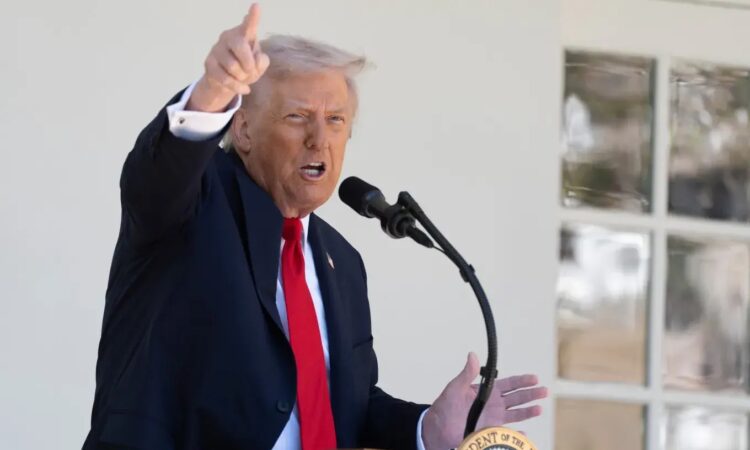
Donald Trump spoke on Tuesday, warning that if Democrats refuse to approve new funding, vital programs like Social Security and Medicare could be at serious risk in the future.
Speaking at a press conference, Trump said that when he asked Democrats for feedback about the funding bills, one of them told him, “It means death.” Trump dismissed that comment, insisting there was nothing about death in the proposal. He argued that it would actually be the opposite — that without funding, people could lose programs like Medicaid, Social Security, and Medicare because the country would go bankrupt and there would be no money left for health insurance.
The issue comes during a tense government shutdown that has now entered its third week. The main point of disagreement is that Democrats have refused to support a funding bill they say unfairly cuts healthcare programs. Republicans, however, argue that the cuts are necessary because some of the funds currently support healthcare for people living in the U.S. illegally.
Social Security and Medicare are two of the most important federal programs in America, providing income and healthcare to tens of millions of citizens, especially seniors and people with disabilities. By late 2024, around 53 million Americans—nearly one in six people—received monthly Social Security payments. Medicare and Medicaid also help cover medical costs for older adults, low-income families, and vulnerable individuals. Any major reduction or change to these programs could have devastating effects on millions of households that depend on them.
At the same press conference, Trump said that if Democrats don’t agree to a deal, those benefits could be in danger. “We will not be extorted on this crazy part of this,” Trump said, criticizing Democrats for refusing to extend funding. “They’ve never done this before. You always vote for an extension.”
A spokesperson for the White House, Abigail Jackson, told Newsweek that Democrats were responsible for the shutdown. “Democrats chose to shut down the government because they want to give free healthcare to illegal aliens,” she said. “They can choose to reopen the government at any point by supporting the bipartisan bill they voted for just six months ago. The Trump Administration is working day and night to reduce the pain Democrats are causing.”
Meanwhile, political strategists from both sides shared their views. Democratic strategist Doug Gordon said that “no one ever wins a shutdown,” but added that it looks bad for Republicans because Speaker Mike Johnson has the House on a paid vacation while Americans are about to face the biggest health cost increase in over a decade. Republican strategist Matt Klink countered that Republicans are comfortable with this fight, arguing that Democrats “overplayed their hand” by trying to push a major policy change during a funding crisis.
The future of the shutdown remains uncertain. As of now, there is no clear sign of when Democrats and Republicans will reach a compromise to reopen the government.
In addition to the funding debate, the Social Security Administration has released key information for 2025. Americans can still work while collecting Social Security benefits, but if they haven’t reached full retirement age, their payments may be temporarily reduced if they earn above a certain limit. Once they reach full retirement age, there are no earnings limits.
Social Security benefits can also be taxed depending on total income. If someone’s combined income—made up of adjusted gross income, nontaxable interest, and half of their Social Security benefits—goes beyond a set threshold, up to 85 percent of those benefits could be taxable.
For 2025, the Social Security wage base cap, which sets the maximum amount of earnings subject to Social Security tax, is $176,100. Any income above that amount won’t be taxed for Social Security, but all earnings remain subject to Medicare tax.
As both sides continue to argue over the shutdown and future funding, millions of Americans remain anxious about whether their benefits and healthcare coverage will stay safe. The debate has highlighted once again how political gridlock in Washington can directly affect the daily lives of ordinary citizens — especially the elderly, disabled, and working-class families who rely on these essential programs.




